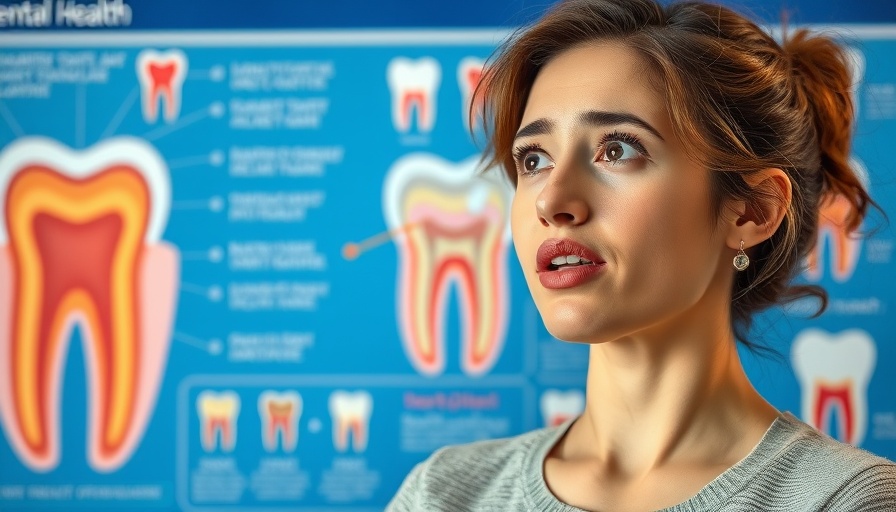
The Importance of Tooth Extraction Awareness for Dental Health
Preparing for tooth extractions can evoke a mixture of anxiety and anticipation, especially for those new to dental procedures. Whether it’s a wisdom tooth, a damaged tooth, or one infected with gum disease, understanding the reasons behind tooth extraction and how to prepare can significantly ease any anxiety. This knowledge transforms a dental visit from a source of dread into an opportunity for enhancing overall health and well-being.
In 'preparing for tooth extractions #shorts', the discussion dives into the vital steps for effective dental care, exploring key insights that sparked deeper analysis on our end.
Why Tooth Extraction May Be Necessary
Tooth extractions are often deemed necessary for various reasons. Wisdom teeth, for instance, frequently crowd the gums and can lead to complications if not removed in a timely manner. Similarly, teeth can become damaged beyond repair due to cavities or trauma, necessitating extraction to prevent infection or further dental issues. Recognizing the signs that indicate the need for extraction, such as persistent tooth pain or swollen gums, can help individuals seek timely dental advice, enhancing their oral hygiene routine.
How to Prepare Emotionally and Physically
Emotional preparation is just as important as physical readiness. Many patients experience dental anxiety, which can amplify the stress surrounding an extraction. To combat this, consider discussing your fears with your dentist beforehand and asking for explanations of each step of the process. Knowing what to expect can provide reassurance. Additionally, practice relaxation techniques like deep breathing or visualization to soothe nerves before the appointment.
Physically, ensure to follow your dentist's pre-op instructions, which may include dietary restrictions or medication adjustments. A healthy meal before the procedure can help maintain energy levels, while avoidance of certain foods can reduce the risk of complications.
Understanding the Post-Extraction Process
After the extraction, it’s crucial to follow proper aftercare guidelines to facilitate healing and avoid issues like dry socket or infection. Most dentists suggest a diet of soft foods for the first few days, which provides nutrition while minimizing discomfort. Staying hydrated is equally important, yet be cautious of using straws, as the suction can disrupt the healing process.
Moreover, managing pain with prescribed medications or over-the-counter options is essential for a comfortable recovery. Ideally, making note of any unusual symptoms, such as excessive bleeding or severe pain, should prompt immediate contact with your dental office.
Health Innovations Supporting Recovery
The world of dental health has seen remarkable innovations aimed at improving comfort and efficiency. For instance, advances in sedation dentistry have transformed the treatment experience for those struggling with anxiety. Moreover, ongoing research into materials for dental implants and crowns showcases the evolving landscape that enhances recovery experiences. Incorporating these innovations into dental care practices can not only elevate patient comfort but also significantly impact recovery times and outcomes.
Debunking Dental Myths Surrounding Extractions
Many misconceptions surround tooth extractions. A common belief is that all extractions result in severe pain, which is far from the truth with modern anesthesia and pain management techniques. Furthermore, some patients fear that extraction means they will have to undergo extensive dental procedures afterward. In reality, the extraction may lead to better overall oral health—clearing the path for more effective braces treatment or healthier gums.
Take Charge of Your Dental Health Journey
Preparing for tooth extractions ensures a smoother process and underscores vital lessons on the significance of proactive dental health management. Engaging in open communication with dental professionals, utilizing mental health strategies for anxiety, and understanding aftercare instructions can pave the way for a positive recovery. If you haven't visited your dentist recently, consider scheduling a checkup to assess your oral health and to address any concerns you might have.
Empower yourself with knowledge and take control of your oral health! To explore more dental tips, consider our resources on effective oral hygiene and innovative dental care products available to you.
 Add Row
Add Row  Add
Add 




Write A Comment